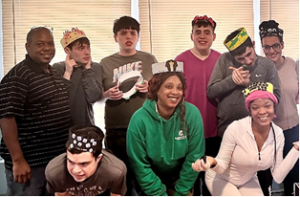Continuing Traditions: Celebrating Passover at BCCS Children’s Residential Program
 Usually, around 4, when the boys in House 28 at the BCCS Children’s Residential Services (CRP) come home from school, they settle down, grab a snack, and enjoy some downtime before eating dinner and then heading out to take on the night’s activities. They keep a busy schedule, but during the first week of April, the boys and staff prepared the home for Passover Seder—a tradition that House 28 has kept for three years now.
Usually, around 4, when the boys in House 28 at the BCCS Children’s Residential Services (CRP) come home from school, they settle down, grab a snack, and enjoy some downtime before eating dinner and then heading out to take on the night’s activities. They keep a busy schedule, but during the first week of April, the boys and staff prepared the home for Passover Seder—a tradition that House 28 has kept for three years now.
The Children’s Residential Program is an OPWDD-certified intermediate care facility (ICF) for children with developmental disabilities. They give children the opportunity to live as independently as they can, in a setting where they are supported and have a chance to live fulfilling lives.
The program consists of four residences—three for boys and one for girls. The school-age children in the residence receive therapies and services, usually until the age of twenty-one, after which they receive assistance for adult placements. House 28, is one of the four dormitory-style houses and is home to six boys from ages eighteen to twenty-three.
Deborah Lapidus, Speech Language Pathologist at AHRC Nassau, organized the Passover Seder dinner and celebrates the occasion with activities for the children.
Three times a week, Deborah regularly works with children on individualized eating guidelines. She also enjoys celebrating Passover with them. For Deborah, this is a great way to incorporate a meaningful tradition while helping build success with eating.
Throughout the years, House 28 has designed and solidified a unique routine to kick off the festival season. Ronny Fisher, Assistant House Manager at the residence, handles the preparation of the symbolic foods for the Seder plate. He makes quick work of it, as he has been part of the celebration for the past three years.
“I think it’s wonderful. The kids enjoy what we’re doing with them. Anything that has to do with food they enjoy,” laughed Ronny, while bringing the food to the table.
With Ronny preparing the table, Julie Schnaars and Josem Naraine, Direct Support Professionals, assisted in gathering the handmade plague hats and finger puppets they supported the kids in making for the dinner. The crafts were made to highlight the different elements of the story. With staff making one for themselves, they managed to represent all ten plagues.
As Ronny finished, Shauntee Dunn, a Direct Support Professional, called everyone to the table and helped them settle in. Deborah passed around Passover coloring pages and story booklets for the boys to look over as she started recounting the Israelites’ liberation from Egypt.
Once gathered around the table, they watched “The Prince of Egypt” and listened to the stories depicting the meaning of each dish. Many of the children are non-verbal and make use of an iPad with an augmented alternative communication app installed to relay their wants and needs. During Passover, the boys used it to provide responses to Deborah who quizzed them on the Passover story.
Deborah, with her Jewish heritage, hosts all the major religious holidays with the children. This allows her to continue the long-established custom some of the kids are used to experiencing at home and see how the eating plans she has in place are working.
Leadership and staff work hard for the home to reflect the environment they come from and reinforce it with robust support, skill development, and recreation. When the boys transition to the house, the staff assists them in making the house their own. They go shopping and try to grab the boys’ favorite things and to recreate the bedroom they had at home.
By making their own traditions and celebrating holidays, the staff effortlessly capture the family environment that one expects from a traditional household. These familial interactions illustrate a core objective of the Children’s Residential Program—to create a real home.
